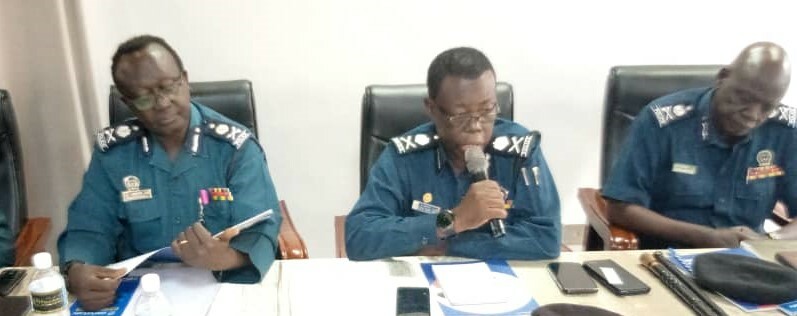The police leadership on Monday assured South Sudanese that police are adequately prepared to discharge their duties before, during and after elections.
Speaking at a meeting on civic education framework organized by the Community Empowerment for Progress Organization (CEPO) in Juba, Maj. Gen. Sidig Ismael Sidgi, the head of the elections security committee, warned that all those hell-bent on acts of criminality during elections will be dealt with by the police.
“We have a plan for the centres where people will vote. We shall deploy our forces to make sure that everyone votes in the right way,” said Gen. Ismael.
The senior police officer assured the public that the police will ensure the protection of all political parties and their leaders before and during elections. “Those who will be campaigning, we will make sure that they are done in the right way,” he said. “We will protect all the political parties, all the citizens, the freedom of expression and also human rights.”
“For post-elections, we assume that some political parties will not accept the results and from there, there will be some disorder. So we have put enough forces to counter those who will be trying to make any disorder,” he said.
General Ismael underscored that the court will handle all complaints relating to electoral processes, saying that the police will not accept violence. “We have estimated the forces who will cover all the 10 states and the three administrative areas. We have forces there and we have a 10 percent increase of forces in case the centre or the constituency increases so we don’t have any problem there,” he said.
The police officer noted that there will be different trainings for the police forces to discharge their duties fully, pointing out that there will be a riot police in case of insecurity during elections.
“We need resources for all these. We had a budget and it will be presented to the government to provide us with the needs so that we cover elections properly,” he said.
General Ismail pointed out that the Ministry of Interior’s work plan for elections has been completed, saying they will invite all stakeholders to make comments on it next week.
“Next week, parliamentarians, civil society, the national elections committee, the United Nations and those who are concerned with these things shall be invited to come to attend our presentation which should be final,” he explained.
On the fate of refugees and internally displaced persons (IDPs) before and during general elections, the police officer said: “In our action plan, we said if the IDPs are not registered or transferred to their own areas, that will not make the elections fair and free because that means their rights will be deprived.”
“The same thing for the refugees. In the action plan, we say if the government can repatriate them before the elections, it should be well and good. But if the government cannot, we recommend to the National Elections Committee that there should be polling stations in the neighbouring countries so that they have the right to vote because one day they will come back,” he added.
On the independence of public institutions, General Ismail said:” People should not worry about the independence of the institutions because when the judiciary reforms committee comes with the report, they will be independent.”
“This is for us as South Sudanese. We want to have free and fair elections. All of us should contribute and our contribution as the police is to make sure that the elections will be free without any violence,” he concluded.
For his part, CEPO Executive Director Edmund Yakani told Radio Tamazuj that the civic education meeting brought together all stakeholders, including the parties to the 2018 peace agreement.
“As you know, we are heading to elections next year and civil education is very important. People need to know about elections. So as a civil society organization, we came up with a plan on how to carry out countrywide civic education,” he said.
“Also, we want our people to know about transitional justice besides elections. So we thank the police because the Director of the Elections Security Committee attended the meeting. So the meeting was very important,” he added.
South Sudan is currently governed by a transitional government created after a 2018 peace agreement between President Salva Kiir, opposition leader Riek Machar and other political figures.
General elections were due to be conducted in February 2023, but the transitional government failed to meet key clauses of the peace agreement, including the drafting of a permanent constitution.
In August 2022, the parties to the agreement extended their transitional government for two years beyond the scheduled date, citing difficulties in implementing the peace agreement.
The parties, however, assured the South Sudanese population and the international community that these difficulties would be resolved before the elections, scheduled for December 2024.




